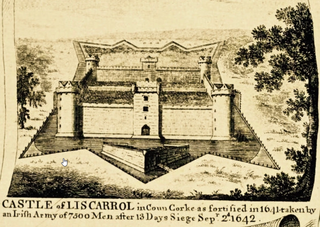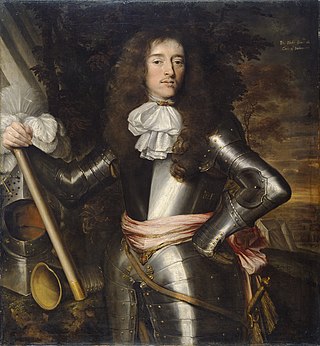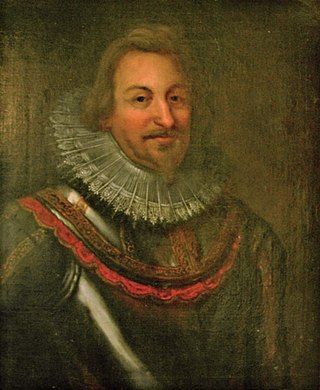| |||||
| Centuries: | |||||
|---|---|---|---|---|---|
| Decades: | |||||
| See also: | Other events of 1648 List of years in Ireland | ||||
Events from the year 1648 in Ireland.
| |||||
| Centuries: | |||||
|---|---|---|---|---|---|
| Decades: | |||||
| See also: | Other events of 1648 List of years in Ireland | ||||
Events from the year 1648 in Ireland.

Baron Inchiquin is one of the older titles in the Peerage of Ireland. It was one of two titles created on 1 July 1543 for Murrough O'Brien, Prince of Thomond, who was descended from the great high king Brian Boru. The grant of the English titles was conditional upon the abandonment of any Irish titles, the adoption of English customs and laws, pledging of allegiance to the Crown, apostasy from the Catholic Church, and conversion to the Church of England. Murrough was made both Earl of Thomond in the Peerage of Ireland, with remainder to his nephew Donough O'Brien and Baron Inchiquin, with remainder to his male heirs. Following the death of his cousin, Conor Myles John O' Brien in June 2023, Conor John Anthony O' Brien is currently the 19th Baron Inchiquin

The Battle of Liscarroll was fought on 3 September 1642 in northern County Cork, Munster, between Irish Confederate and Royalist troops. The battle was part of the Irish Confederate Wars, which had started in the north in 1641 reaching Munster in 1642. The Confederates, about 8,500 strong, were led by Garret Barry, an Irish veteran from the Spanish Army of Flanders. The Royalist forces, about 2,400 strong, were commanded by Murrough O'Brien, 6th Baron of Inchiquin, an Irish Protestant. Despite his numerical disadvantage Inchiquin routed his enemies by the strength of his cavalry and the firepower of his musketeers.

Corofin is a town on the River Fergus in northern County Clare, Ireland and also a parish of the same name in the Catholic Diocese of Killaloe.

Sir Murrough O'Brien, 10th Baron of Inchiquin, 5th Baron O'Brien of Burren, 1st Baron Thomond of Taplow, 5th Earl of Inchiquin, 1st Marquess of Thomond KP, PC (Ire), known from 1777 to 1800 as the 5th Earl of Inchiquin, was an Irish peer, soldier and politician.
Earl of Thomond was an hereditary title in the Peerage of Ireland. It was created twice for the O'Brien dynasty which is an ancient Irish sept native to north Munster.
Theobald Stapleton, alias Teabóid Gálldubh, was an Irish Roman Catholic priest born in County Tipperary, Ireland. Little is known of his career, except that he was a priest living in Flanders.
Events from the year 1642 in Ireland.

Murrough O'Brien, 1st Earl of Thomond was the last King of Thomond, and a descendant of the High King of Ireland, Brian Boru.
Events from the year 1643 in Ireland.
Events from the year 1674 in Ireland.
Events from the year 1647 in Ireland.

William McWilliam O'Brien, 4th Earl of Inchiquin, 9th Baron Inchiquin, KB, PC(I) was an Irish peer and Whig politician who sat in the House of Commons between 1722 and 1754.
The post of Lord President of Munster was the most important office in the English government of the Irish province of Munster from its introduction in the Elizabethan era for a century, to 1672, a period including the Desmond Rebellions in Munster, the Nine Years' War, and the Irish Rebellion of 1641. The Lord President was subject to the Lord Deputy of Ireland, but had full authority within the province, extending to civil, criminal, and church legal matters, the imposition of martial law, official appointments, and command of military forces. Some appointments to military governor of Munster were not accompanied by the status of President. The width of his powers led to frequent clashes with the longer established courts, and in 1622 the President, Donogh O'Brien, 4th Earl of Thomond, was warned sharply not to "intermeddle" with cases which were properly the business of those courts. He was assisted by a Council whose members included the Chief Justice of Munster, another justice and the Attorney General for the Province. By 1620 his council was permanently based in Limerick.

Murrough MacDermod O'Brien, 1st Earl of Inchiquin, was an Irish nobleman and soldier, who came from one of the most powerful families in Munster. Known as Murchadh na dTóiteán, he initially trained for war in the Spanish service. He accompanied the Earl of Strafford into Leinster on the outbreak of the Irish Rebellion of 1641 and was appointed governor of Munster in 1642. He had some small success, but was hampered by lack of funds and he was outwitted by the Irish leader, Viscount Muskerry, at Cappoquin and Lismore. His forces dispersed at the truce of 1643.
Dermod McMurrough O'Brien was the 2nd Baron Inchiquin. He was the son of Murrough O'Brien, 1st Earl of Thomond and Eleanor FitzGerald. O'Brien married Margaret O'Brien, daughter of Donough O'Brien, 2nd Earl of Thomond.
Dermod McMurrough O'Brien, 5th Baron Inchiquin was an Irish baron.

There were six early Barons Inchiquin in Ireland between 1543 and 1654. The title was granted to Murrough O'Brien, the brother of Conor O'Brien, King of Thomond, when he surrendered his Irish royalty to King Henry VIII in 1543. His descendants held the title until 1654, when Murrough O'Brien, 6th Baron Inchiquin was created Earl of Inchiquin.
The Custos Rotulorum of Clare was the highest civil officer in County Clare. The position was later combined with that of Lord Lieutenant of Clare.
Murrough may refer to: